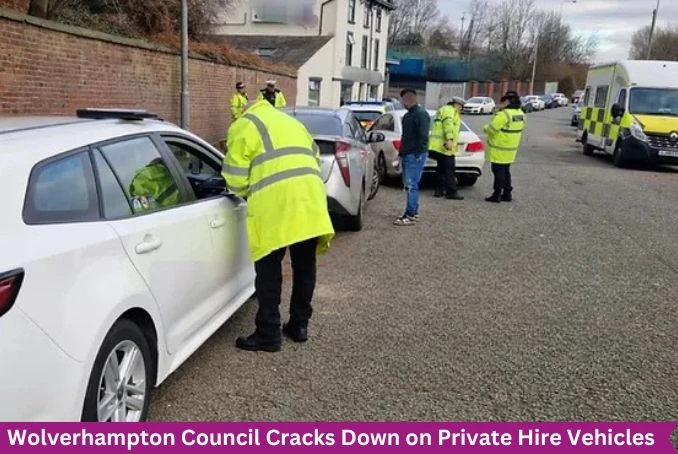
In a decisive move to enhance public safety and uphold licensing standards, Wolverhampton Council has recently intensified its enforcement efforts regarding private hire vehicles (PHVs) operating beyond their usual licensing territory. This initiative, executed in collaboration with Greater Manchester Police and the Driver and Vehicle Standards Agency (DVSA), underscores the growing complexities surrounding cross-border hiring in the UK taxi industry.
Wolverhampton has emerged as a key player in the UK taxi licensing landscape, with a significant number of drivers obtaining their licenses from this council and operating in various regions, including Greater Manchester. The practice of cross-border hiring, while legal under UK law, poses unique challenges for local authorities. It permits licensed private hire vehicles to operate anywhere as long as they are dispatched from a licensed operator within the issuing council’s jurisdiction. However, this flexibility can complicate enforcement efforts aimed at ensuring vehicle safety and compliance with local regulations.
This situation arises primarily because Wolverhampton has become a hub for taxi licensing due to its comparatively lenient processes and lower fees. As a result, many drivers from other areas choose to apply for their licenses there, leading to an increasing number of licensed vehicles operating outside Wolverhampton. The council’s challenge lies in monitoring these vehicles to ensure they meet safety standards, irrespective of where they are working.
In a recent operation conducted in Middleton, Greater Manchester, the licensing team from Wolverhampton Council identified two vehicles licensed by the council that exhibited accident-related damage. As a result, these vehicles had their licenses suspended, highlighting the council’s commitment to maintaining high safety standards for all vehicles operating within and outside its boundaries.
This enforcement action reflects a growing trend among local councils to take a more proactive stance on compliance. Councils are recognising that they cannot solely rely on the drivers to adhere to safety regulations; they must also actively monitor vehicles, especially those operating outside their jurisdiction. The importance of such inspections cannot be overstated, as they serve to protect the public and ensure that the vehicles on the road are fit for purpose.
Vehicle safety in the private hire industry is of paramount importance. Accidents involving PHVs can have serious consequences, not only for the passengers but also for other road users. The tragic reality is that even minor accidents can lead to significant injuries or fatalities. By conducting thorough inspections and enforcing compliance, councils aim to reduce the risk of accidents and ensure that all vehicles operating in their areas are roadworthy.
The recent suspension of the two vehicles in Middleton serves as a stark reminder of the potential dangers posed by non-compliant vehicles. Wolverhampton Council’s partnership with law enforcement and regulatory bodies like the DVSA is vital in this regard. Their collaborative efforts aim not only to identify non-compliant vehicles but also to educate drivers on the importance of maintaining their vehicles and adhering to safety standards.
Despite the clear need for robust enforcement, the task is not without its challenges. Licensing authorities must navigate a complex legal framework that varies across different regions. While cross-border hiring is legal, the responsibility for ensuring that vehicles are safe and compliant often falls to the council that issued the license, regardless of where the vehicle is operating.
This can lead to scenarios where councils are stretched thin, trying to monitor vehicles that may be hundreds of miles away from their home jurisdiction. Moreover, the sheer volume of PHVs operating across different councils complicates matters further. Councils must ensure they have the resources and strategies in place to carry out effective inspections and enforcement actions.
In light of these challenges, many councils are beginning to leverage technology to assist in their enforcement efforts. Advanced tracking systems and reporting tools can help councils monitor licensed vehicles more effectively. For instance, GPS tracking can provide real-time data on where vehicles are operating, enabling councils to identify potential compliance issues.
Furthermore, technology can aid in the communication between councils, allowing them to share information about licensed drivers and vehicles more efficiently. Such collaborative efforts can help ensure that safety standards are upheld across regions, fostering a more cohesive approach to enforcement in the taxi industry.
Public trust in the taxi and private hire industry is essential for its continued success. Passengers need to feel secure when using PHVs, and the knowledge that licensing authorities are actively monitoring vehicle safety can enhance this trust. Transparency in enforcement actions, such as the recent suspensions in Middleton, can reassure the public that authorities are taking their responsibilities seriously.
Moreover, effective communication from councils regarding their enforcement activities can help demystify the licensing process for drivers and passengers alike. By providing clear information about safety standards and compliance requirements, councils can foster a culture of accountability within the industry.
The recent actions taken by Wolverhampton Council serve as a reminder of the ongoing challenges and responsibilities faced by local authorities in regulating the taxi industry. As the landscape evolves, it is crucial for councils to adapt their strategies to ensure that public safety remains a priority. By focusing on compliance and safety, Wolverhampton Council is setting a standard that other local authorities may look to emulate in their own enforcement efforts.
With the increasing number of vehicles operating across borders, the need for robust monitoring and enforcement is more critical than ever. By staying informed and proactive, councils can better navigate the complexities of cross-border hiring while ensuring that all licensed vehicles meet the necessary safety and operational standards. As the taxi industry continues to grow, the emphasis on safety and compliance will remain crucial for fostering public trust and maintaining high service quality.
In an ever-evolving industry, it is the commitment to safety that will ultimately enhance the reputation of the private hire sector and ensure its long-term viability.
Copyright © 2024 Harrow Minicab Rights Reserved